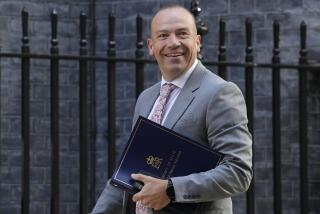Britain Seeks to Sell Ulster on Peace Plan : Europe: Cabinet ministers and other officials lobby for Anglo-Irish proposal.
- Share via
LONDON — Reinforcing statesmanship with salesmanship, the British government on Thursday addressed a stark, simple appeal to the divided and trouble-weary people of Northern Ireland: Give peace a chance.
Cabinet ministers and government officials ricocheted in articulate procession from radio and television interviews to press briefings to parliamentary debate to lobby for a historic proposal aimed at sidetracking sectarian hatreds in the bloodied province.
“In the sixth month of peace, people don’t want it rejected. People want compromise. Now, we will want to see how the pudding cooks,” Patrick Mayhew, secretary of state for Northern Ireland, told American reporters.
Flush with success after agreeing with the Irish government on a framework for a peace agreement published Wednesday, the government of Prime Minister John Major is now hoping that public opinion will jostle angry Protestant politicians toward the negotiating table.
Across Northern Ireland, people flocked to post offices for copies of the 6,000-word framework Thursday.
At one point, callers to toll-free numbers were requesting copies at the rate of 400 per hour. The government promises that every one of the province’s 600,000 households--divided about 2 to 1 between Protestants and Roman Catholics--will get a copy.
Protestant leaders supporting union between Britain and the Connecticut-sized province of 1.6 million denounced the initiative as a sellout.
“I’ve never been so angry. I can’t accept something that inevitably trundles us to a united Ireland. This is clearly dead in the water. We need to find another way,” said Ken Maginnis, one of the more moderate unionists in the British Parliament.
On Thursday, the 13 unionist members of Parliament met amid veiled threats that they will withdraw the automatic support they had given until now to Major’s minority government.
“I am not surprised by the unionist reaction but encouraged by signals that they will not walk away,” Mayhew said.
Withdrawal of unionist support could undermine his rule, but Major, an unpopular prime minister often scored as gray and inclined to waffle, is fiercely committed to ending the nobody-wins trauma in Ulster.
“I am not going to be a persuader for a united Ireland. I am a unionist who wants peace for the unionists, peace for the nationalists and a rational, sane future for Northern Ireland,” Major told Parliament.
He has pledged that there will be no changes except through majority consent.
Speaking with the American reporters, Mayhew said the government has no timetable for a next step. Rather, he said, once the document has been digested, it will be up to the Protestant and Catholic communities in Northern Ireland to open bilateral discussion of the Anglo-Irish proposals--and any new ideas of their own.
*
Most of Britain’s major national dailies hailed the peace initiative Thursday.
Tony Blair, leader of the opposition Labor Party, voiced his support. Sinn Fein, which calls for a united Ireland and is the political arm of the terrorist Irish Republican Army, applauded the tone of the framework.
“Unionists are out on a limb. . . . Northern Ireland’s embattled unionist leadership is dangerously isolated and under enormous pressure to compromise with forces of Irish nationalism,” the Guardian said.
Under the Anglo-Irish framework, intended as a starting point for discussion between Ulster communities rather than a blueprint, Dublin would abandon its constitutional claim to sovereignty over Northern Ireland--an entity created in 1920 when the rest of Ireland became independent--and London would change its law to recognize the right of the province’s people to opt out of Britain.
An elected Parliament would administer the province and join with Ireland in cross-border administration in some areas, a particular sore point for Protestant leaders, who see it as a fatal step toward eventual Irish control of Ulster.
Violence triggered by Catholic and Protestant terrorists since 1969 has claimed 3,200 lives and left the economically stagnant provincial capital of Belfast cruelly divided by a “peace wall” between Protestant and Catholic neighborhoods.
A cease-fire declared Aug. 31 by the IRA and later joined by Protestant terrorists has dramatically changed the atmosphere, however.
British commentators say the thirst for sustained peace is manifest and that it will work to Major’s benefit.
“The cessation of violence suggests that extreme nationalists (the IRA) may have achieved a maturity that recognizes the impossibility of bombing their way to a united Ireland,” the Independent newspaper said Thursday. “Also, the longer peace lasts, the greater the chance that a beleaguered unionist community will open itself to dialogue and change. Anecdotally, there are signs that some people are becoming more flexible. They may surprise their political representatives.”
More to Read
Sign up for Essential California
The most important California stories and recommendations in your inbox every morning.
You may occasionally receive promotional content from the Los Angeles Times.













